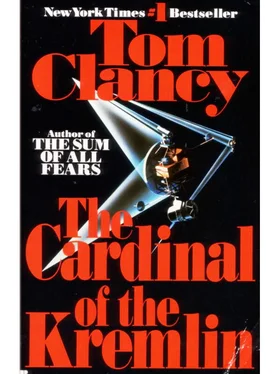Tom Clancy - The Cardinal of the Kremlin
Здесь есть возможность читать онлайн «Tom Clancy - The Cardinal of the Kremlin» весь текст электронной книги совершенно бесплатно (целиком полную версию без сокращений). В некоторых случаях можно слушать аудио, скачать через торрент в формате fb2 и присутствует краткое содержание. Год выпуска: 1988, Жанр: Триллер, на английском языке. Описание произведения, (предисловие) а так же отзывы посетителей доступны на портале библиотеки ЛибКат.
- Название:The Cardinal of the Kremlin
- Автор:
- Жанр:
- Год:1988
- ISBN:нет данных
- Рейтинг книги:3 / 5. Голосов: 1
-
Избранное:Добавить в избранное
- Отзывы:
-
Ваша оценка:
- 60
- 1
- 2
- 3
- 4
- 5
The Cardinal of the Kremlin: краткое содержание, описание и аннотация
Предлагаем к чтению аннотацию, описание, краткое содержание или предисловие (зависит от того, что написал сам автор книги «The Cardinal of the Kremlin»). Если вы не нашли необходимую информацию о книге — напишите в комментариях, мы постараемся отыскать её.
The Cardinal of the Kremlin — читать онлайн бесплатно полную книгу (весь текст) целиком
Ниже представлен текст книги, разбитый по страницам. Система сохранения места последней прочитанной страницы, позволяет с удобством читать онлайн бесплатно книгу «The Cardinal of the Kremlin», без необходимости каждый раз заново искать на чём Вы остановились. Поставьте закладку, и сможете в любой момент перейти на страницу, на которой закончили чтение.
Интервал:
Закладка:
Colonel Filitov finished the diary entry. As Bondarenko had pointed out, his knowledge of technical material was far better than one might suspect from his academic credentials. After over forty years in the higher echelons of the Defense Ministry, Misha was self-taught in a number of technical fields ranging from gas-protection suits to communications-encryption equipment to… lasers. Which was to say that while he didn't always comprehend the theory as well as he might have wished, he could describe the working equipment as well as the engineers who assembled it. It had taken four hours to transcribe it all into his diary. This data had to go out. The implications were too frightening.
The problem with a strategic-defense system was simply that no weapon had ever been "offensive" or "defensive" in and of itself. The nature of any weapon, like the beauty of any woman, lay in the eye of the beholder – or the direction in which it was pointed – and throughout history, success in warfare was determined by the proper balance of offensive and defensive elements.
Soviet nuclear strategy, Misha thought to himself, made far more sense than that of the West. Russian strategists did not consider nuclear war unthinkable. They were taught to be pragmatic: The problem, while complex, did have a solution – while not a perfect one, unlike many Western thinkers they acknowledged that they lived in an imperfect world. Soviet strategy since the Cuban Missile Crisis of 1962 – the event had killed Filitov's recruiter, Colonel Oleg Penkovskiy – was based on a simple phrase: "Damage Limitation." The problem wasn't destroying one's enemy with nuclear weapons. With nuclear weapons, it was more a question of not destroying so much that there would be nothing left with which to negotiate the "war-termination" phase. The problem that occupied Soviet minds was preventing enemy nuclear weapons from destroying the Soviet Union. With twenty million dead in each of two world wars, the Russians had tasted enough destruction, and craved no more.
This task was not viewed as an easy one, but the reason for its necessity was as much political as technical. Marxism-Leninism casts history as a process: not a mere collection of past events, but a scientific expression of man's social evolution that will – must – culminate in mankind's collective recognition that Marxism-Leninism is the ideal form for all human society. A committed Marxist, therefore, believed in the ultimate ascendancy of his creed as surely as Christian, Jew, and Muslim believed in an afterlife. And just as religious communities throughout history have shown a willingness to spread their good news with fire and sword, so it was the duty of the Marxist to make his vision a reality as quickly as possible.
The difficulty here, of course, was that not everyone in the world had the Marxist-Leninist view of history. Communist doctrine explained this away as the reactionary forces of imperialism, capitalism, the bourgeoisie, and the rest of their pantheon of enemies, whose resistance was predictable – but whose tactics were not. As a gambler who has rigged his gaming table, the communists "knew" that they would win, but like a gambler, in their darker moments they reluctantly admitted that luck – or more scientifically, random chance – could alter their equation. In lacking the proper scientific outlook, the Western democracies also lacked a common ethos, and that made them unpredictable.
More than any other reason, that was why the East feared the West. Ever since Lenin had assumed control of – and renamed – the Soviet Union, the communist government had invested billions in spying on the West. As with all intelligence functions, its prime purpose was to predict what the West would and could do.
But despite countless tactical successes, the fundamental problem remained: Time and again the Soviet government had gravely misread Western actions and intentions; and in a nuclear age unpredictability could mean that an unbalanced American leader – and, to a lesser extent, English or French – could even spell the end of the Soviet Union and the postponement of World Socialism for generations. (To a Russian, the former was more grave, since no ethnic Russian wanted to see the world brought to Socialism under Chinese leadership.) The Western nuclear arsenal was the greatest threat to Marxism-Leninism; countering that arsenal was the prime task of the Soviet military. But unlike the West, the Soviets did not see the prevention of its use as simply the prevention of war. Since the Soviets viewed the West as politically unpredictable, they felt that they could not depend on deterring it. They needed to be able to eliminate, or at least degrade, the Western nuclear arsenal if a crisis threatened to go beyond the point of mere words.
Their nuclear arsenal was designed with precisely this task in mind. Killing cities and their millions of inhabitants would always be a simple exercise. Killing the missiles that their countries owned was not. To kill the American missiles had meant developing several generations of highly accurate – and hugely expensive – rockets like the SS-18, whose sole mission was to reduce America's Minuteman missile squadrons to glowing dust, along with the submarine and bomber bases. All but the last were to be found well distant from population centers; consequently, a strike aimed at disarming the West might be carried off without necessarily resulting in world holocaust. At the same time, the Americans did not have enough really accurate warheads to make the same threat against the Soviet missile force. The Russians, then, had an advantage in a potential "counterforce" attack – the sort aimed at weapons rather than people.
The shortcoming was naval. More than half of the American warheads were deployed on nuclear submarines. The U.S. Navy thought that its missile submarines had never been tracked by their Soviet counterparts. That was incorrect. They had been tracked exactly three times in twenty-seven years, and then never more than four hours. Despite a generation of work by the Soviet Navy, no one predicted that this mission would ever be accomplished. The Americans admitted that they couldn't track their own "boomers," as the missile submarines were known. On the other hand, the Americans could track Soviet missile submarines, and for this reason the Soviets had never placed more than a fraction of their warheads at sea, and until recently neither side could base accurate counterforce weapons in submarines.
But the game was changing yet again. The Americans had fabricated another technical miracle. Their submarine-launched weapons would soon be Trident D-5 missiles with a hard-target-kill capability. This threatened Soviet strategy with a mirror-image of its own potential, though a crucial element of the system was the Global Positioning Satellites, without which the American submarines would be unable to determine their own locations accurately enough for their weapons to kill hardened targets. The twisted logic of the nuclear balance was again turning on itself – as it had to do at least once per generation.
It had been recognized early on that missiles were offensive weapons with a defensive mission, that the ability to destroy the opponent was the classical formula both to prevent war and achieve one's goals in peace. The fact that such power, accrued to both sides, had transformed the historically proven formula of unilateral intimidation into bilateral deterrence, however, made that solution unpalatable.
Nuclear Deterrence: preventing war by the threat of mutual holocaust. Both sides told the other in substance, If you kill our helpless civilians, we will kill yours. Defense was no longer protection of one's own society, but the threat of senseless violence against another. Misha grimaced. No tribe of savages had ever formulated such an idea – even the most uncivilized barbarians were too advanced for such a thing, but that was precisely what the world's most advanced peoples had decided – or stumbled – upon. Although deterrence could be said to work, it meant that the Soviet Union – and the West – lived under a threat with more than one trigger. No one thought that situation satisfactory, but the Soviets had made what they considered the best of a bad bargain by designing a strategic arsenal that could largely disarm the other side if a world crisis demanded it. In achieving the ability to eliminate much of the American arsenal, they had the advantage of dictating how a nuclear war would be fought; in classical terms that was the first step toward victory, and in the Soviet view, Western denial that "victory" was a possibility in a nuclear war was the first step toward Western defeat. Theorists on both sides had always recognized the unsatisfactory nature of the entire nuclear issue, however, and quietly worked to deal with it in other ways.
Читать дальшеИнтервал:
Закладка:
Похожие книги на «The Cardinal of the Kremlin»
Представляем Вашему вниманию похожие книги на «The Cardinal of the Kremlin» списком для выбора. Мы отобрали схожую по названию и смыслу литературу в надежде предоставить читателям больше вариантов отыскать новые, интересные, ещё непрочитанные произведения.
Обсуждение, отзывы о книге «The Cardinal of the Kremlin» и просто собственные мнения читателей. Оставьте ваши комментарии, напишите, что Вы думаете о произведении, его смысле или главных героях. Укажите что конкретно понравилось, а что нет, и почему Вы так считаете.






![Александр Ирвин - Tom Clancy’s The Division 2. Фальшивый рассвет [litres]](/books/417744/aleksandr-irvin-tom-clancy-s-the-division-2-falsh-thumb.webp)





